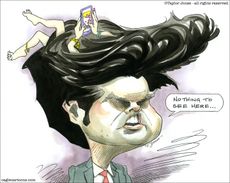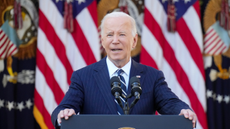Before Edward Snowden, there was Jonathan Pollard
Meet the spy at the center of efforts to rescue Arab-Israeli peace talks


The United States considers him one of the most damaging spies in recent history. Israel considers him a martyr. And now, he may be coming home.
Jonathan Pollard, who has been imprisoned for nearly 30 years after giving U.S. military and intelligence secrets to Israel, may be released within the next two weeks as part of what two officials familiar with the discussions described as an effort to salvage the flailing Israeli-Palestinian peace talks. (Those talks were thrown into further disarray on Tuesday, when Palestinian Authority President Mahmoud Abbas formally entered applications to join 15 international agencies, essentially asserting Palestinian statehood.) In exchange, these people said, Israel would consider releasing 14 Israeli-Arab prisoners who've also been jailed for decades as well, potentially, as Marwan Barghouti, a prominent Palestinian militant. White House spokesman Jay Carney neither confirmed nor denied the reports. "I have nothing new...that I haven't said in the past, which is that [Pollard] was convicted of espionage and that he is serving his sentence," Carney said. The State Department dismissed the discussions as "rumors about what may or may not be on the table."
Pollard, who was sentenced to life in prison in 1987, has long maintained that he only gave information to Israel — an American ally — so it could protect itself from hostile countries in the Middle East. Not so, say intelligence officials who served at the time of Pollard's crimes.
Subscribe to The Week
Escape your echo chamber. Get the facts behind the news, plus analysis from multiple perspectives.

Sign up for The Week's Free Newsletters
From our morning news briefing to a weekly Good News Newsletter, get the best of The Week delivered directly to your inbox.
From our morning news briefing to a weekly Good News Newsletter, get the best of The Week delivered directly to your inbox.
"Much of what he took, contrary to what he'd have you believe, had nothing to do with Arab countries or the security of Israel, but had everything to do with U.S. collection methods, to include most specifically against the Soviet Union," retired Adm. Thomas Brooks, the former director of naval intelligence, said in an interview. Pollard worked for Brooks in 1980 when Brooks was in charge of a Navy intelligence office based at Ft. Meade, Md, which is also the headquarters of the National Security Agency.
Among the highly prized secrets that former officials say Pollard gave away while working as a civilian intelligence analyst for the Navy were technical details of sophisticated U.S. spy satellites; analyses of Soviet missiles systems; and information about eavesdropping equipment used by the NSA to intercept foreign governments' communications, including all ten volumes of a highly classified manual known as "the Bible" that spelled out how the United States intercepted Soviet communications.
This isn't the first time that Pollard's release has been floated in the midst of U.S.-brokered Middle East peace talks. In 1998, President Bill Clinton was prepared to release Pollard during the summit at Wye River, Md., but the effort was scuttled when intelligence officials protested and then-Director of Central Intelligence George Tenet threatened to resign.
That reveals the depths of U.S. spies' animosity toward Pollard, whom many regard as one of the most harmful spies in recent history. Three decades after Pollard confessed to giving Israel a stack of documents that, by his own estimation, would have measured six-by-six feet and stood 10-feet high, intelligence veterans insist that Pollard did far more damage to U.S. national security than is generally known.
Sign up for Today's Best Articles in your inbox
A free daily email with the biggest news stories of the day – and the best features from TheWeek.com
"I think what he did is exceeded only by Edward Snowden," said Brooks, drawing an analogy between Pollard and the former NSA contractor who gave millions of pages of classified documents about eavesdropping systems to journalists, and who's now living in Russia under a grant of political asylum.
But Pollard's supporters have been adamant that he should be released from prison, and that he never should have served this long. Pollard is regarded as a national hero in Israel, where nearly every prime minister since the time of his arrest, in 1985, has called for his release. In the late 1990s, the presidents of 55 major American Jewish organizations jointly called for Pollard to be set free. And for decades, there have been mass protests both in Israel and the United States calling on a succession of American presidents to free Pollard, both on humanitarian grounds and, his supporters say, because he gave information to a close U.S. ally, and was unjustly accused of betraying the United States. Many of those protests are organized by Pollard's wife, whom he married while in prison and remains one of his staunchest defenders.
When Brooks supervised Pollard, he dismissed Pollard and sent him to work in another office, where he was stripped of his security clearances, because Pollard showed signs of being "mentally unstable," Brooks said.
A few years later, Pollard's security clearances were restored, and shortly thereafter he began spying for Israel, Brooks said. "Giving that [intelligence] away was a tremendous boon to the Soviets," he said, repeating a frequently levied charge that classified intelligence made its way into Soviet hands. Some former officials have claimed that Israel bartered the purloined intelligence in exchange for the Soviet Union allowing Jews to emigrate to Israel.
Brooks said that in his opinion, the information Pollard gave to Israel was probably stolen by Soviet spies. "The Mossad at the time was well penetrated by the KGB," Brooks said. "Based on the degree of penetration by the Russians, it would be very, very strange if they didn't get access to it."
Brooks said that the damage to U.S. intelligence efforts was considerable and long-lasting, and included sources of intelligence that were permanently lost to American spies. A former senior intelligence official said the number of documents Pollard stole was among the largest in U.S. history up to that point.
In a 1999 New Yorker article, journalist Seymour Hersh interviewed former intelligence officials who said they could measure the cost of Pollard's spying in terms of communications channels that went silent. "The data passed along by Pollard included detailed information on the various platforms — in the air, on land, and at sea — used by military components of the National Security Agency to intercept Israeli military, commercial, and diplomatic communications," Hersh wrote.
Hersh quoted an anonymous intelligence expert who claimed that U.S. intelligence personnel noticed a significant decrease in the communications traffic they were monitoring, including at NSA listening posts in England, Tel Aviv, and Cyprus. "We could see the whole process [of collecting intelligence] slowing down," the expert told Hersh.
In 1998, Brooks, along with three fellow retired admirals who had served as directors of naval intelligence, wrote a letter to the Washington Post to dispel what they called "myths" that Pollard was an Israeli patriot who wanted to help Israel protect itself from a surprise attack. "Pollard pleaded guilty and therefore was never publicly tried," the retired admirals wrote. "Thus, the American people never came to know that he offered classified information to three other countries before working for the Israelis and that he offered his services to a fourth country while he was spying for Israel."
They didn't name the countries, but Pollard reportedly offered classified material to South Africa, Argentina, and Taiwan, and also was in touch with Pakistani and Iranian sources about trying to broker arms. Pollard was motivated my money and greed, the admirals said, applauding Clinton for not releasing the spy. Pollard didn't deny taking payment for his services — more than half a million dollars, prosecutors alleged at his sentencing hearing in 1987 — but claimed he was being rewarded simply for doing a good job, and that he intended to pay back some of the money.
One former intelligence official said the amount of information Pollard stole, as well as the "indiscriminate" nature with which he took it, is what most outraged U.S. spies. Pollard couldn't have known everything that he took, nor could he be sure that it was only shared with the Israelis, the former official said.
In a sworn statement to the judge presiding over Pollard's sentencing, then-Secretary of Defense Caspar Weinberger said Pollard had compromised several classified intelligence systems. Weinberger also reportedly told the judge there was suspicion — though no proof — that intelligence Pollard gave to Israel was later obtained by the Soviet Union.
Pollard told Hersh that as far as signals intelligence — NSA's bread and butter — was concerned, the U.S. government "has consistently lied in its public version of what I gave the Israelis."
Brooks, the retired admiral who once supervised Pollard, said he had no objections to his being released now. Pollard is eligible for parole next year, so even if he's not freed as part of current peace talks, he might not remain in prison much longer.
"I really don't care what happens to him," Brooks said. "He's had a long time in prison." Brooks said he wouldn't object to parole or even a commutation of Pollard's life sentence. "But I have a great, great opposition to pardoning him," he said, an act that can only come from the president. "He has no sense of remorse or guilt whatsoever."
John Hudson and Yochi Dreazen contributed reporting.
More from Foreign Policy...
-
 5 contentious cartoons about Matt Gaetz's AG nomination
5 contentious cartoons about Matt Gaetz's AG nominationCartoons Artists take on ethical uncertainty, offensive justice, and more
By The Week US Published
-
 Funeral in Berlin: Scholz pulls the plug on his coalition
Funeral in Berlin: Scholz pulls the plug on his coalitionTalking Point In the midst of Germany's economic crisis, the 'traffic-light' coalition comes to a 'ignoble end'
By The Week UK Published
-
 Joe Biden's legacy: economically strong, politically disastrous
Joe Biden's legacy: economically strong, politically disastrousIn Depth The President boosted industry and employment, but 'Bidenomics' proved ineffective to winning the elections
By The Week UK Published